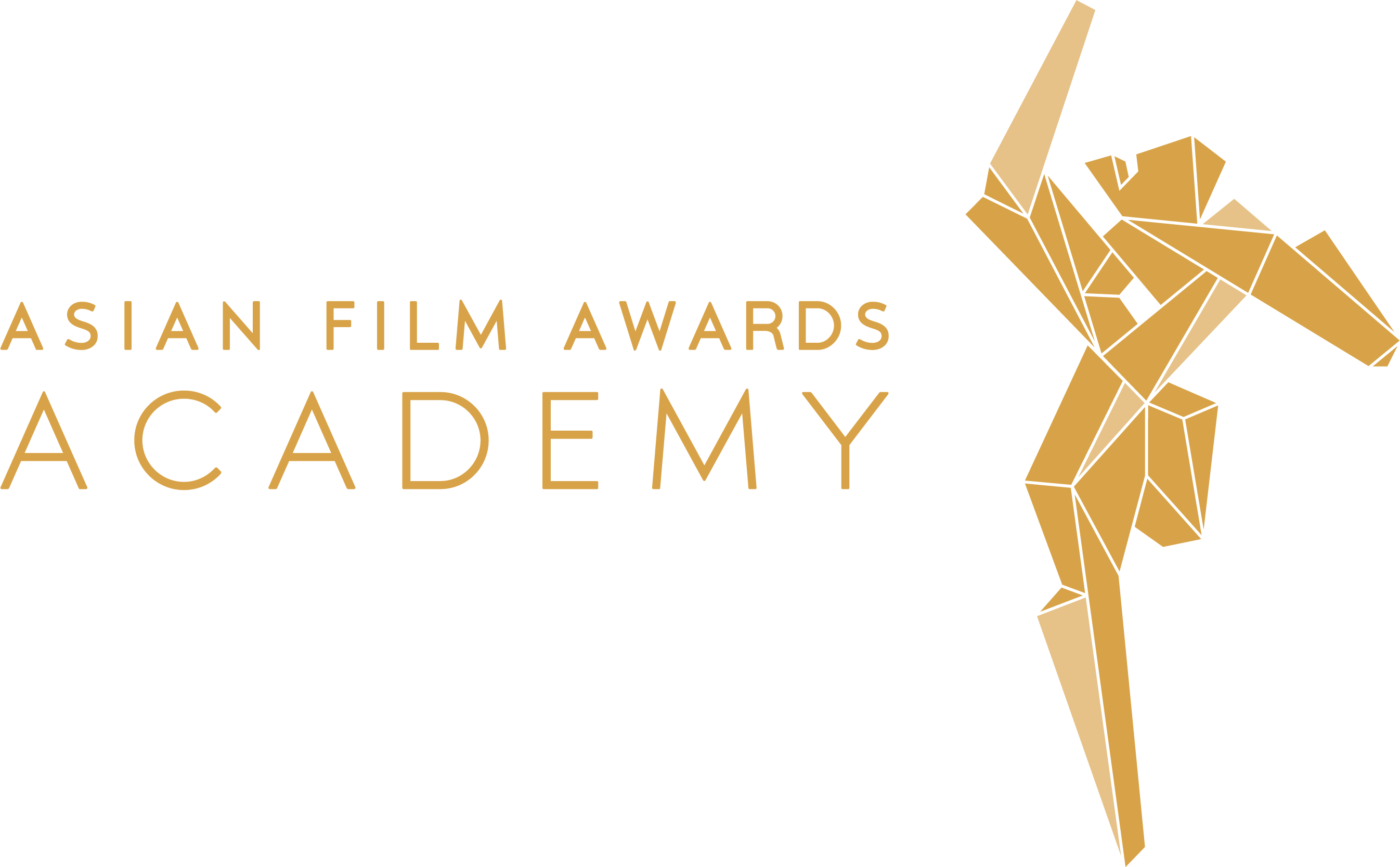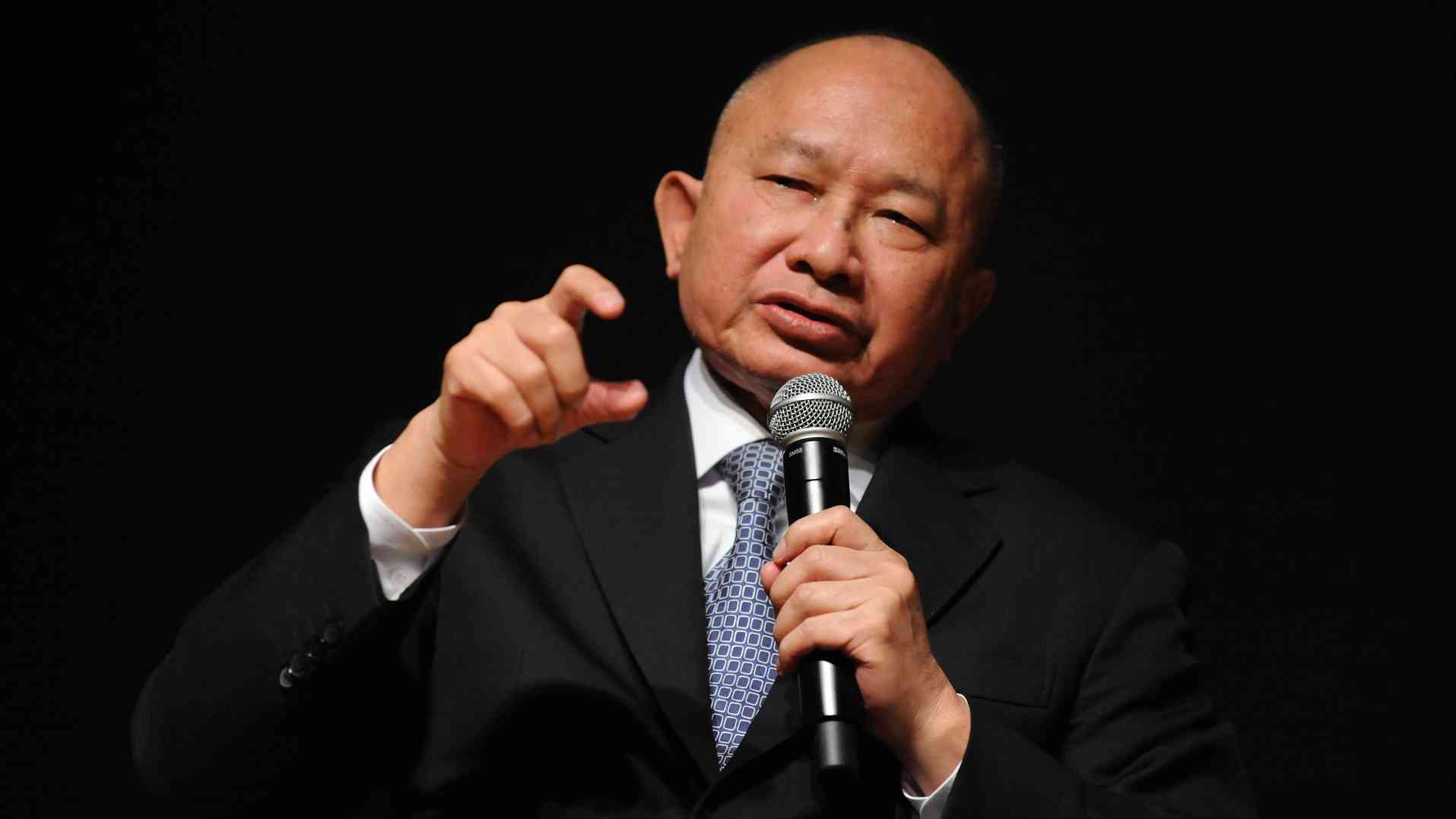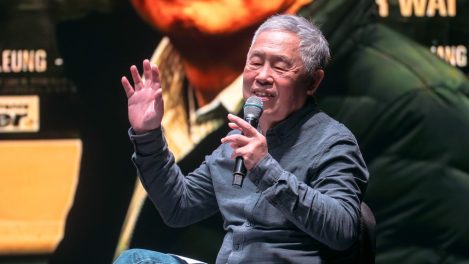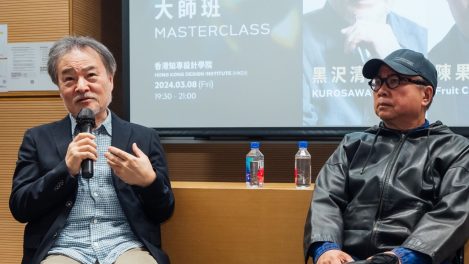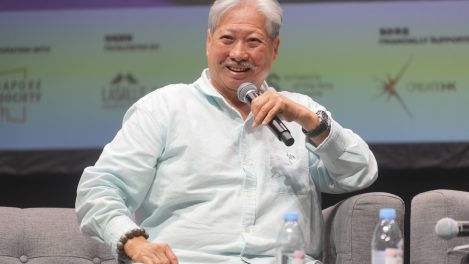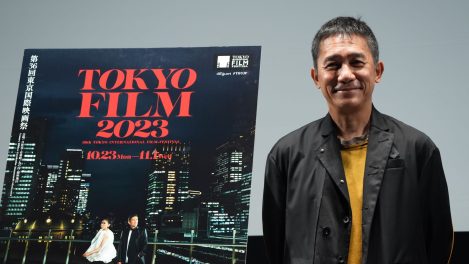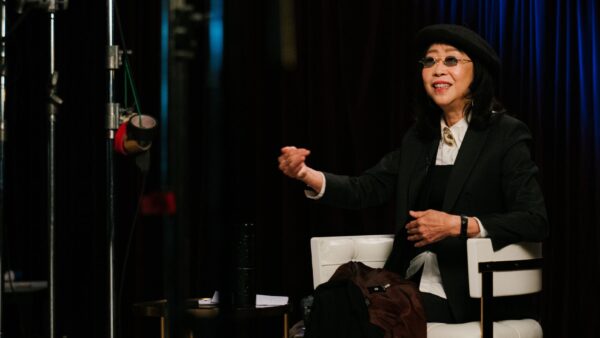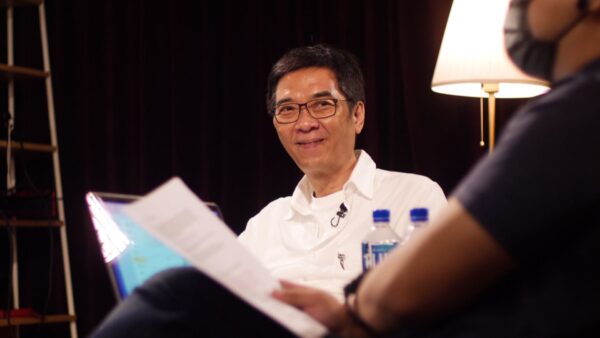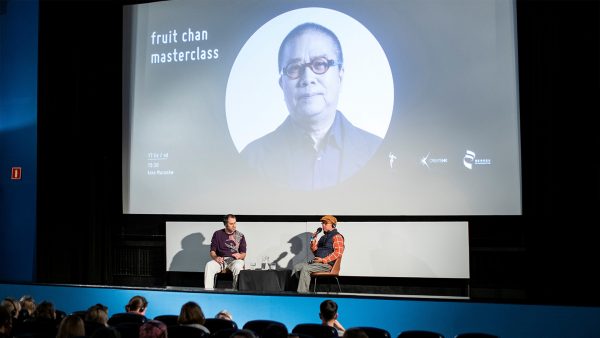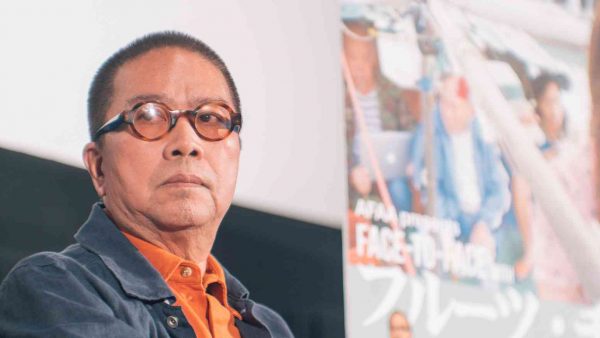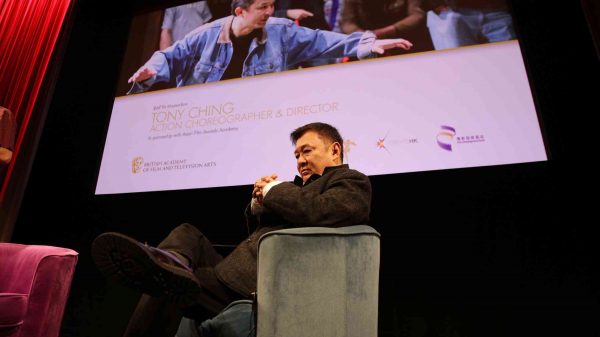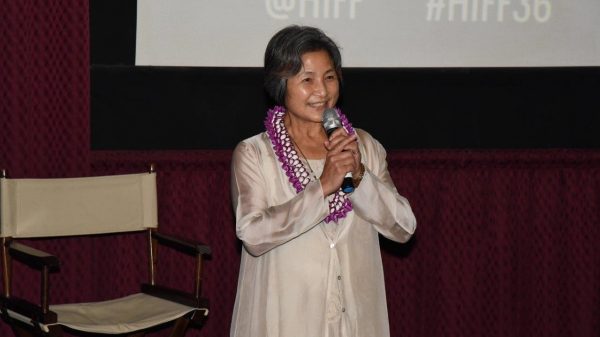오우삼
낡은 것을 부수고 새로운 것을 창조하다Date: 25 October 2015
Location: Tokyo (49/F, Tower Hall, Academy Hills, Roppongi)
Guest: John Woo
Moderator: Hatori Shinich
Partners: Tokyo International Film Festival
Complementing the occasion of internationally acclaimed Hong Kong director John Woo receiving the prestigious 2nd SAMURAI Award from the 28th Tokyo International Film Festival (TIFF), the Asian Film Awards Academy (AFA Academy) joined efforts with the TIFF to present a masterclass titled SAMURAI Award Special Talk “In Person: John Woo” to the Japanese audience at Academyhills, a major event venue in Tokyo.
TIFF’s SAMURAI Award is given to filmmakers “who continue to create ground-breaking films that carve a path to a new era.” John Woo, this year’s recipient along with Yoji Yamada, is certainly one of the most innovative filmmakers in the history of world cinema. Most of the key elements of the modern action movie that we now take for granted were developed by Woo in the 1980s: the controlled chaos of his gunfights, the use of slow motion to intensify violence, the huge amounts of blood. The Hong Kong police melodramas that starred Chow Yun-Fat and which made Woo’s reputation – A Better Tomorrow, The Killer, Bullet in the Head, Hard Boiled – gained him entry to Hollywood, where he had mixed success directing big budget films like Broken Arrow, Face/Off, and Mission: Impossible II. He eventually returned to Asia and has since adapted his unique style to historical epics like Red Cliff.
TIFF’s SAMURAI Award is given to filmmakers “who continue to create ground-breaking films that carve a path to a new era.” John Woo, this year’s recipient along with Yoji Yamada, is certainly one of the most innovative filmmakers in the history of world cinema. Most of the key elements of the modern action movie that we now take for granted were developed by Woo in the 1980s: the controlled chaos of his gunfights, the use of slow motion to intensify violence, the huge amounts of blood. The Hong Kong police melodramas that starred Chow Yun-Fat and which made Woo’s reputation – A Better Tomorrow, The Killer, Bullet in the Head, Hard Boiled – gained him entry to Hollywood, where he had mixed success directing big budget films like Broken Arrow, Face/Off, and Mission: Impossible II. He eventually returned to Asia and has since adapted his unique style to historical epics like Red Cliff.
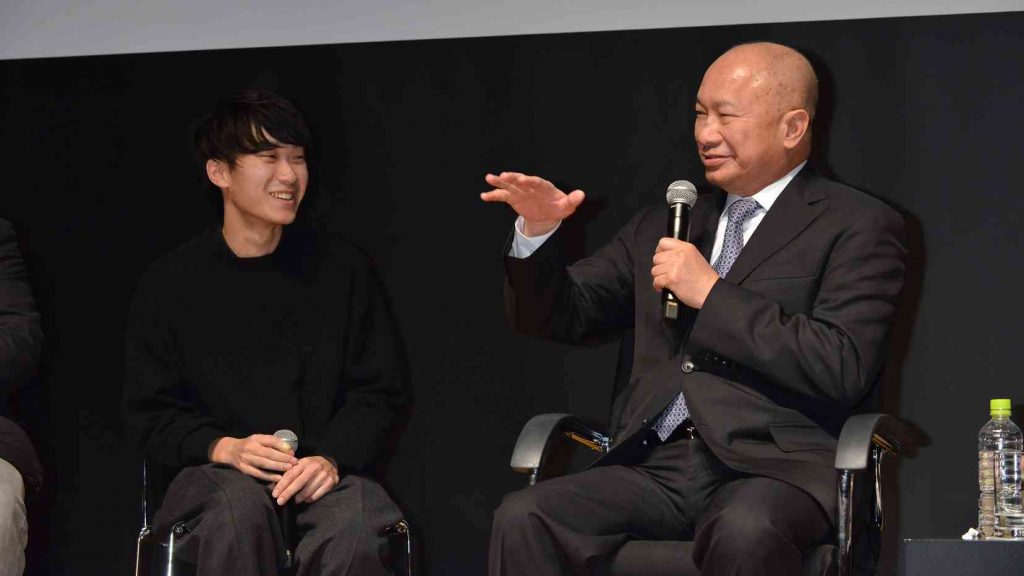
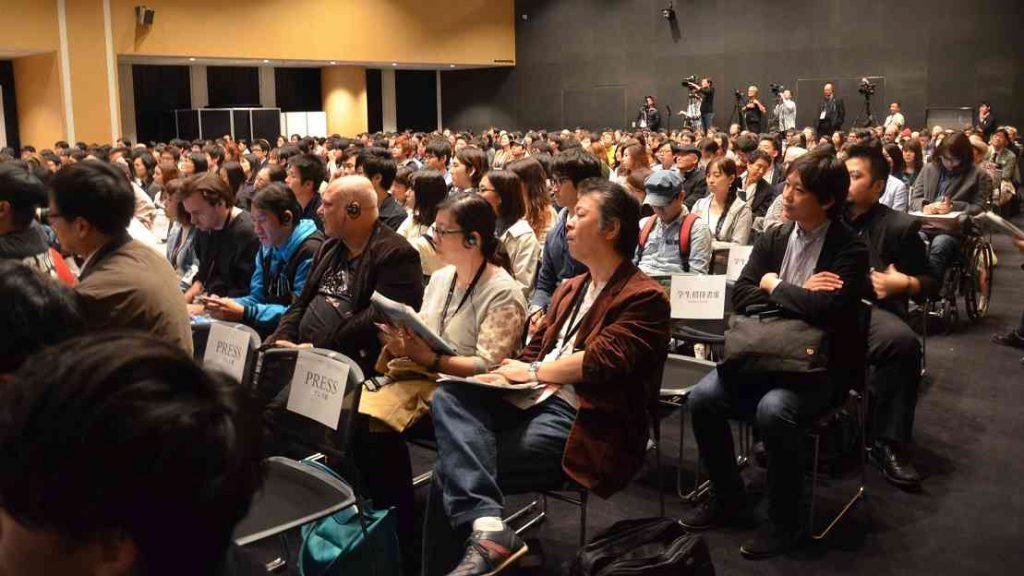
As Woo explained during a special talk at the Academyhills Tower Hall, when he entered the Hong Kong film industry in the 1960s there was no film school. “I liked movies as a child,” he explained. “I would read all about movies at the library.” He learned how to make movies – writing, directing, and producing – through the Hong Kong film industry’s apprenticeship system, which he said he found difficulty since he had to do what others wanted to do and often had to put aside his own ideas. He actually thought of himself as an “auteur.”
In that regard, his favorite directors were those who conveyed a distinctive style regardless of the genre they were working in: Akira Kurosawa, David Lean, and, especially, Sam Peckinpah, whose use of violence greatly influenced Woo’s own style. Another director whose movies informed his thinking about the crime action genre was Jean-Pierre Melville. Along with Lean’s Lawrence of Arabia and Kurosawa’s Seven Samurai, Melville’s Le Samouraï, is one of his three favorite films of all time.
He went on to explain that A Better Tomorrow, made in 1986, was his “turning point.” Until then, crime movies were very clear cut: “You knew who was good and who was bad.” But the characters in A Better Tomorrow had shadings of both good and bad, regardless of whether they were cops or gangsters. Thanks to producer Tsui Hark, Woo was able to make the kind of movie he had always envisioned but couldn’t make because of the way the production system worked. The film’s success allowed him greater freedom within that system, and after The Killer (1989) – an homage to Japanese director Teruo Ishii – became an international sensation, he was invited to work in Hollywood, though it would be another four years before he took up the offer with the Jean-Claude Van Damme vehicle, Hard Target.
At first, he was impressed with the American system. “It’s very professional, and everybody is very good at their job,” he said. “And they treat you well.” However, he eventually found that his ideas didn’t always please his producers, and often he would clash with the people paying for the movie he was making. In Hong Kong, “the director has total power over the script,” he said, but in Hollywood his requests for script changes were often refused. “I became very angry a few times,” he admitted. This conflict came to a head on the movie Face/Off, starring John Travolta and Nicolas Cage, and he eventually won: the script was changed to suit his vision, and the movie was a huge hit. He even had the final word on editing, which is very unusual for a Hollywood blockbuster. “Maybe only five directors have that kind of power,” he said.
After ten years in California, he returned to Hong Kong to take part in China’s emergence as a major film production hub, and found that “China was not the same as Hong Kong” in terms of how films were made, but by then Woo could do anything he wanted, anywhere.
In that regard, his favorite directors were those who conveyed a distinctive style regardless of the genre they were working in: Akira Kurosawa, David Lean, and, especially, Sam Peckinpah, whose use of violence greatly influenced Woo’s own style. Another director whose movies informed his thinking about the crime action genre was Jean-Pierre Melville. Along with Lean’s Lawrence of Arabia and Kurosawa’s Seven Samurai, Melville’s Le Samouraï, is one of his three favorite films of all time.
He went on to explain that A Better Tomorrow, made in 1986, was his “turning point.” Until then, crime movies were very clear cut: “You knew who was good and who was bad.” But the characters in A Better Tomorrow had shadings of both good and bad, regardless of whether they were cops or gangsters. Thanks to producer Tsui Hark, Woo was able to make the kind of movie he had always envisioned but couldn’t make because of the way the production system worked. The film’s success allowed him greater freedom within that system, and after The Killer (1989) – an homage to Japanese director Teruo Ishii – became an international sensation, he was invited to work in Hollywood, though it would be another four years before he took up the offer with the Jean-Claude Van Damme vehicle, Hard Target.
At first, he was impressed with the American system. “It’s very professional, and everybody is very good at their job,” he said. “And they treat you well.” However, he eventually found that his ideas didn’t always please his producers, and often he would clash with the people paying for the movie he was making. In Hong Kong, “the director has total power over the script,” he said, but in Hollywood his requests for script changes were often refused. “I became very angry a few times,” he admitted. This conflict came to a head on the movie Face/Off, starring John Travolta and Nicolas Cage, and he eventually won: the script was changed to suit his vision, and the movie was a huge hit. He even had the final word on editing, which is very unusual for a Hollywood blockbuster. “Maybe only five directors have that kind of power,” he said.
After ten years in California, he returned to Hong Kong to take part in China’s emergence as a major film production hub, and found that “China was not the same as Hong Kong” in terms of how films were made, but by then Woo could do anything he wanted, anywhere.
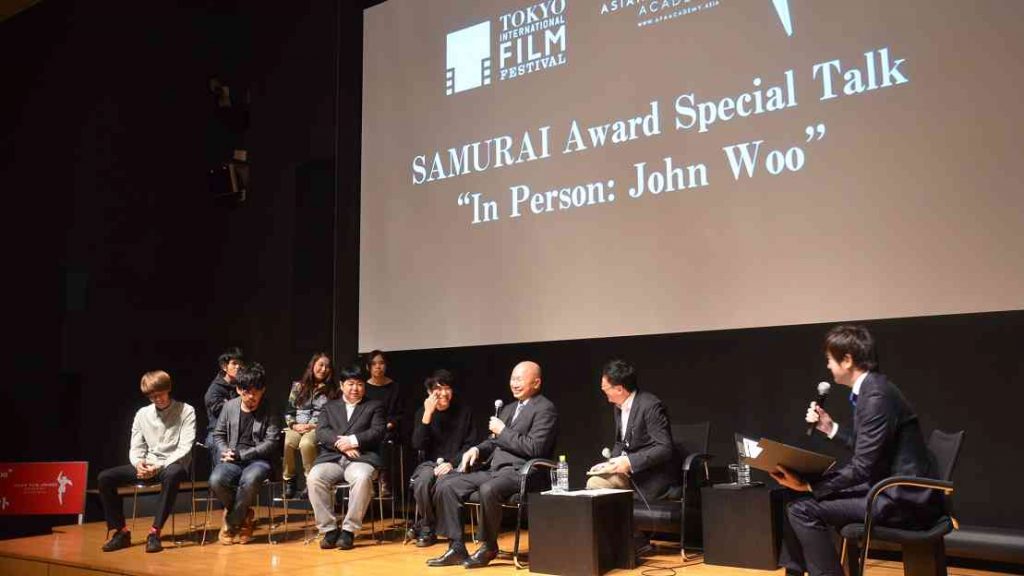
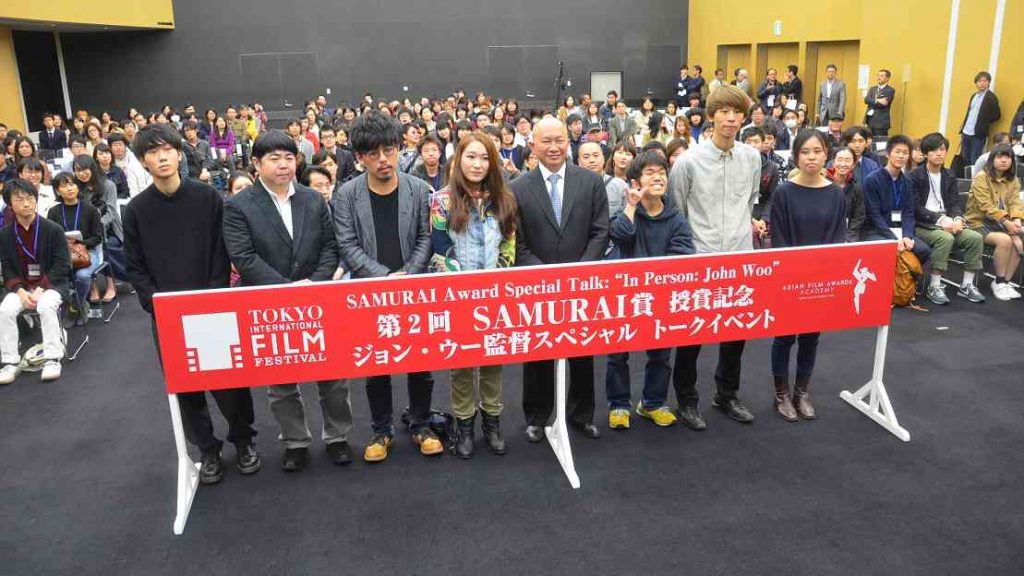
Later, seven young Japanese directors came on stage and asked Woo questions about his style, methodology, and general philosophy. When one of the directors asked what he had seen lately that “excited” him, he answered, “Actually, I’m easily excited.” “Emotions are the most important things,” he said. “A movie has to convey a sense of justice, too. That’s why when I shoot a film, I don’t think of it as appealing to a Western audience or to an Asian audience. They should have universal themes that appeal to all humanity.” Even nominally “bad” people can do good things as long as they adhere to a sense of justice.
He elaborated on this point later while answering a question from a journalist about people perhaps “misapprehending” his work. Apparently, the first edit of Face/Off did not contain a key element that Woo wanted, which was for the John Travolta character to adopt the son of his slain enemy in the end, since such a plot development would provide the sense of justice he felt was necessary, but the producers thought American viewers wouldn’t get it. However, when they tested the movie with average people, the response was negative, so they recut the film with Woo’s ending, and he turned out to be right. People felt better about the movie as a whole.
Before he left, he was asked if he liked any recent Japanese films, and he said, “Maybe I’m old, but I prefer older Japanese films and that old Japanese filmmaking spirit.” Unfortunately, there wasn’t enough time for him to talk about his new film, which is reportedly an adaptation of a Japanese novel that was previously filmed in 1976 and starred one of Woo’s favorite actors, the late Ken Takakura. There is even talk he may film some of it in Japan, probably to tap some of that Japanese filmmaking spirit.
He elaborated on this point later while answering a question from a journalist about people perhaps “misapprehending” his work. Apparently, the first edit of Face/Off did not contain a key element that Woo wanted, which was for the John Travolta character to adopt the son of his slain enemy in the end, since such a plot development would provide the sense of justice he felt was necessary, but the producers thought American viewers wouldn’t get it. However, when they tested the movie with average people, the response was negative, so they recut the film with Woo’s ending, and he turned out to be right. People felt better about the movie as a whole.
Before he left, he was asked if he liked any recent Japanese films, and he said, “Maybe I’m old, but I prefer older Japanese films and that old Japanese filmmaking spirit.” Unfortunately, there wasn’t enough time for him to talk about his new film, which is reportedly an adaptation of a Japanese novel that was previously filmed in 1976 and starred one of Woo’s favorite actors, the late Ken Takakura. There is even talk he may film some of it in Japan, probably to tap some of that Japanese filmmaking spirit.

다른 마스터클래스 시리즈
두독치
TU Duu-chih Hosts First Masterclass in Hong Kong, Exploring Sound Design Creativity and His Experience on Classic Films.
구로사와 기요시 X 프루트 챈
Renowned thriller master KUROSAWA Kiyoshi and Hong Kong’s independent film pioneer Fruit CHAN shared their creative philosophies and cinematic insights during the AFA17 Featured Programmes Masterclass..
Tony Leung
Hong Kong actor Tony Leung shared insights from his career with the Japanese audience at the Masterclass series at the Tokyo International Film Festival.
장완정
장완정은 역사적으로 의미있는 이야 기를 전했다. 그녀 자신이 영향력 있 는 감독으로서의 경험을 마스터클래 스에서 공유하였다.
관금붕
홍콩의 거장 관금붕의 영화에 대 한 깊은 이야기를 들을 수 있었 던 기회
프릇 첸
프룻 첸은 작품으로 국제적인 인정받 은 홍콩 감독 중 한명이다.
프릇 첸
31회 도쿄 국제 영화제에서 페이스 투 페이스 마스터 클래스를 진행한 홍콩의 감독겸 제작자 프룻 첸
정소동
마스터클래스에서 조명한 정소동의 중국무협환타지 장르와 영화 무술 액 션 스타일
정패패
정페이페이는 마스터클래스에서 영화역사에서 첫번째 여성 무협 스타가 된 그녀의 지난 삶을 이야 기했다.
